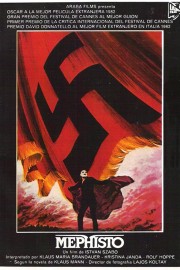Mephisto
Klaus Maria Brandauer’s performance in “Mephisto” is something to be seen. For 146 minutes, he makes us laugh, feel intense, and confounded in the role of a lifetime, playing an actor afforded an opportunity to act his way through life as much as he does on the stage. It is a shame that it took the ’80s All Over for this to be on my radar, and the closure of indie theatres during the COVID-19 pandemic for me to be able to really watch it; now that I have, I find it riveting, and unforgettable.
If you are an actor, at the rise of the Nazi Party in Germany, what are your options? If you were a member of the Party, and stood for what they did, you were safe, but if not- and one would imagine that would be the case for most people in the industry, at the time- you would leave the country, go underground, or find a way to continue working. Most of Hendrik Höfgen’s friends, including his liberal wife and her father, leave, either for Paris (which will be under German occupation in a few years), or go underground. Höfgen’s choice to stay, one that leads him to being put in control of the German State Theatre, thanks- in large part- to his performance as Mephistopheles in a production of Faust. How does Höfgen, who is not caring about politics, get drawn into being the Nazi face of German theatrical renewal? He cannot resist the spotlight he is given.
Istvan Szabo’s film was the Oscar winner for Foreign Language film for the 1981 movie year, and it’s easy to see why it made such an impression. Not only is it about an actor whose work professionally leads to challenges personally, which is always a popular Oscar subject, but it also deals with Nazi Germany, and even though this adaptation of the Klaus Mann novel does not lead into WWII, or the atrocities of the Nazis, that is- again- a popular Oscar subject. The film is seen entirely through the life of Hendrik, as he is entertaining the masses with Bolshevik stage productions, and juggling a life of privilege with his wife and an affair with a black performer. Hendrik is a bit of a buffoon at the outset, and he does not really take things too seriously, except acting. That, to him, is sacred, and when we see his Mephistopheles, there’s an energy to his performance that is invigorating to watch; we see why it left an impression with the right people. As the Nazis take over, and his friends leave, he is increasingly isolated, even when he seems to be on the right side of the right people, and not at risk of his past shenanigans getting him in trouble with the strict nationalist tone of the Nazis.
The fundamental drama of “Mephisto” is not whether Hendrik sells his soul to the devil in charge of his country, but why he does so? We do not see a change of heart in his values- there are moments where he seems to defy the official line for personal reasons- but we also cannot trust how he is looking at things from a purely selfish perspective. His fame is why he’s willing to look the other way on some of the atrocities of the party. And yet, he isn’t above hiding anti-Nazi propaganda, or trying to convince leaders that two stage hands are essential, and thus, not threats. Seeing him interact with members of the party, he is fully believable in his role of pro-Nazi Germany artist. When his luster seems to come off, however, we see an anxiety in him, though, that is palpable, and impossible to shake. This is a morality play of the highest order, about a time in history that brought out the worst in humanity, and in opportunists who saw a way to get the recognition they felt owed to them. Thirty nine years later, this feels as modern, and relevant, now as it was then.










